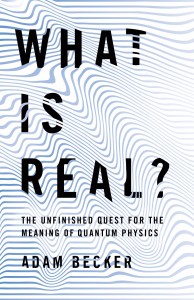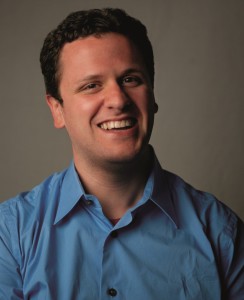Quantum mechanics is a standard part of every undergraduate physics degree, but often it’s presented as “Here’s a mathematical formalism that works, end of story.” What is Real? by Adam Becker, released last week, tackles the history of how physicists have thought about the interpretation of quantum mechanics, starting with the Copenhagen interpretation but continuing through various dissenting views, such as Bohm’s pilot wave theory and Everett’s many worlds interpretation. His focus is as much on the politics and personalities that have shaped how we think about the field as it is on science and philosophy, which makes for an enlightening and entertaining read — I got through much of the book on a snowy Saturday at home, having difficulty putting it down.
We asked Adam some questions about the book and the stories behind it.

You mention on your website you’ve been wanting to write this book for years. What kicked off your interest in the foundations of quantum mechanics?
There wasn’t any single event—it was a gradual process. I read pop science books that seemed very clear when it came to relativity, but didn’t do a very good job with quantum physics. I figured I’d understand what they were talking about once I actually took a quantum mechanics class, but that just made things worse, not better. After I asked one too many questions about quantum measurement, one professor told me (in a tone of utter disdain) that if I was interested in that kind of question, I should go off to the Philosophy Department. When I did, I started getting some very different (and much more clear) answers than I was getting from most of the physicists. And not everyone in the Physics Department was unwilling to entertain questions about quantum physics: in particular, I was lucky enough to take a course with David Mermin as an undergraduate. After spending time talking with Mermin and with philosophers of science, I was hooked: I had to understand what was going on in the quantum world. Of course, I still don’t!
Are there any anecdotes from the history of quantum foundations that didn’t make it into the final book that you’d like to share with us?
There are so many great stories that made it into the book (Bell’s silence on the subject of Bertlmann’s socks might be my favorite), and there are also many good ones that didn’t. For example, von Neumann threw serious shade at Dirac’s textbook when he was writing his own, which was amazing to see. I don’t know about my favorite story, but here’s a fun one that I think is very revealing about the personalities involved: Abner Shimony (a prominent philosopher of physics) and Louis de Broglie (who needs no introduction). Shimony was one of the leaders of the four-person team that proposed the first experimental test of Bell’s theorem, known as CHSH after their initials. Shimony sent a preprint of the CHSH paper to Bell, of course, but he also sent a preprint to de Broglie, along with a letter. “I felt that courtesy demanded a letter in French, and I drafted one, but had a French professor friend correct the grammar and locutions,” said Shimony. “De Broglie replied, with the utmost courtesy, in handwriting that resembled the Declaration of Independence.” So Shimony sent back another letter in French, and had a French professor correct his grammar again. After another round or so of this, a mutual friend told Shimony that de Broglie was deeply impressed by Shimony’s letters. De Broglie said that “here is one American who knows how to write a proper letter.” But when their mutual friend offered to introduce Shimony to de Broglie, Shimony balked. “Of course I refused,” Shimony said, “because I obviously could not sustain the game!”
I understand if you’re reticent to answer this, because in your book you’ve obviously put a lot of work into presenting the various interpretations of quantum mechanics equitably, but I’d love to know: which alternative to Copenhagen do you actually prefer? Or are you still waiting for a satisfying interpretation?

The short answer is that I’m still waiting. The longer answer is that I go back and forth on liking all of the available options and liking none of them. (I don’t include Copenhagen in this, because it’s not a real interpretation.) Each interpretation has its appeal, and its problems. All of the interpretations are strange, of course—they’re guaranteed to be strange as a result of Bell’s theorem, the Bell-Kochen-Specker theorem, and other results. So strangeness isn’t a problem. But there’s the question of logical coherence, of presenting an internally consistent picture of the world, even if it’s a deeply alien one. And there’s also the question of reproducing not just the successes of quantum mechanics, but also those of quantum field theory and the Standard Model. The different interpretations attempt to meet these challenges in different ways. Many of them look promising, but right now I don’t think any of them can lay claim to an unequivocal solution to all of these problems. For example, pilot-wave theory is definitely coherent (even its opponents will generally concede that), but it’s unclear whether there’s a way to get QFT out of it. The many-worlds interpretation can definitely account for QFT, but there’s serious debate over its internal coherence. So for now, I’m on the fence, but I’m happy here. It’s certainly better to have serious debate over interesting options, even if I’m not convinced by any one of them, than it is to have debate stifled with a pseudo-solution like the Copenhagen interpretation.
In the final chapter, you talk about the fact that many physicists are unfamiliar with the history and philosophy of science (guilty as charged!). Can you suggest one or two current players in that field whose work you think more physicists should be familiar with?
It’s hard to just pick one or two! But off the top of my head: I think the philosopher David Albert and the historian Olival Freire Jr. are both doing really incredible work that more physicists should be familiar with. The first half of Albert’s book Quantum Mechanics and Experience is a brilliant introduction to the problems at the core of quantum physics (the later chapters are somewhat out of date but still make interesting reading). Albert continues to do a lot of good philosophical work in quantum foundations. He’s also made major contributions to other parts of the philosophy of physics, such as the philosophy of statistical mechanics. And Freire’s book The Quantum Dissidents is a phenomenal piece of historical scholarship. Without that book, I don’t know how I could possibly have written mine, not without years more research. Thankfully, Freire and his students did much of the research for me. Reading his book will change the way you look at the history of quantum physics.
What are your feelings about the future? Do you see alternatives to “shut up and calculate” becoming more mainstream in physics teaching and practice? Why/why not?
I hope so, and there’s reason for hope. There’s certainly been a trend over the past 40 years away from the Copenhagen interpretation. Mostly, that’s been a shift toward many-worlds, and I’d rather see a wider variety of options becoming mainstream, but it’s still a lot better than nothing. It’d be nice to foreground questions about quantum foundations a bit more in introductory quantum physics classes, and I don’t see that happening yet—and even when it does, there’s usually very little discussion of alternatives to Copenhagen. So I think (and hope) that’s the next big change coming: open discussion of different interpretations in introductory classes becoming the rule rather than the exception. The widely-used Griffiths textbook is a good step in the right direction, with its appendix on Bell’s theorem and interpretive issues, but there’s still more work to do there. Foregrounding the subject and expanding on it, rather than relegating it to an appendix, seems like the right move to me. But then again, I’m biased—I just wrote a whole book with quantum foundations as the foreground!



Please sign in or register for FREE
If you are a registered user on Research Communities by Springer Nature, please sign in